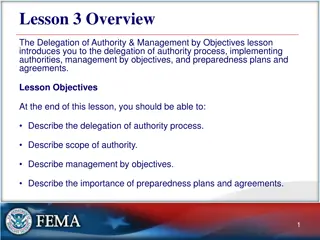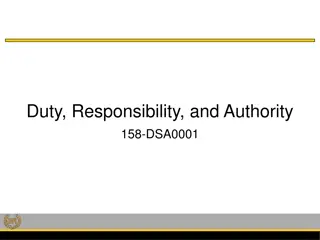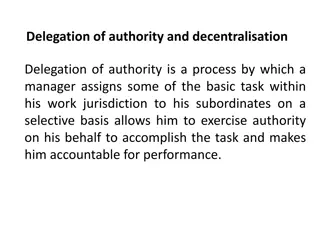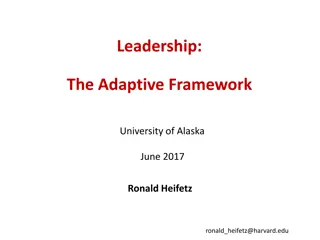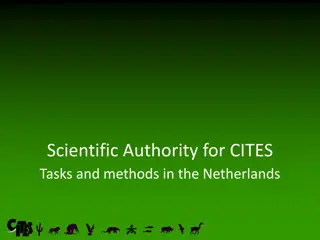Essential Concepts in Leadership and Authority in Healthcare
Effective leaders and managers play a crucial role in healthcare and health information technology projects. Leadership using authority, power, and expert knowledge are key components in ensuring successful management and outcomes in healthcare organizations. Authority in the C-Suite, power to influence actions, and expert authority all contribute to effective leadership in the healthcare industry.
Download Presentation

Please find below an Image/Link to download the presentation.
The content on the website is provided AS IS for your information and personal use only. It may not be sold, licensed, or shared on other websites without obtaining consent from the author. Download presentation by click this link. If you encounter any issues during the download, it is possible that the publisher has removed the file from their server.
E N D
Presentation Transcript
SUCCESSFUL MANAGERS AND LEADERS HCS 290 Unit 3 This work is licensed under a Creative Commons Attribution-NonCommercial-ShareAlike 4.0 International License.Based on a work at http://oli.cmu.edu. This workforce product was funded by a grant awarded by the U.S. Department of Labor's Employment and Training Administration. The product was created by the grantee and does not necessarily reflect the official position of the U.S. Department of Labor. The Department of Labor makes no guarantees, warranties, or assurances of any kind, express or implied, with respect to such information, including any information on linked sites and including, but not limited to, accuracy of the information or its completeness, timeliness, usefulness, adequacy, continued availability, or ownership.
Effective leaders and managers are critical to healthcare and health information technology. HIT projects hinge on effective leadership. Competent management ensures that details are attended to and problems are corrected.
LEADERSHIP, AUTHORITY, AND POWER Leadership Using Authority Authority is the right to use power that is sanctioned by law or policy. When a president is inaugurated in the United States, his or her role and authority are determined by statute. A CEO is selected by a board of directors. Both of these examples describe leadership by authority. A term that is also used to describe this kind of leadership is legitimacy.
LEADERSHIP USING AUTHORITY (CONT..) The recognized authority in a healthcare corporation is in the C-Suite: CEO (chief executive officer) CFO (chief financial officer) CIO (chief information officer) CMO (chief medical officer) NOTE: C-Suite is often referred to the senior executives of an organization often having titles that start with the letter C such as chief executive, chief medical officer, etc.
LEADERSHIP USING POWER Power, in the context of leadership, can be defined as the ability to influence an individual to take action he or she would not have taken otherwise. Some leaders exercise immense power without authority.
LEADERSHIP POWER IN THE ROLE OF EXPERT AUTHORITY Leadership power is also recognized in the role of expert authority. An individual with extraordinary skills and accomplishments will often develop a considerable following, which can result in informal power. Examples of expert authorities could be individuals with high-level knowledge and skills in the following occupations: Next Slide
LEADERSHIP POWER IN THE ROLE OF EXPERT AUTHORITY (CONT..) Physician Nurse HIT manager or technician Project manager Practice manager Vendor
KINDS OF INTELLIGENCE When measuring intelligence, experts have long recognized that standard intelligence quotient (IQ) tests. The IQ test is a measure of the test taker s cognitive abilities. Some of these abilities include long- and short-term memory, quantitative and reasoning ability, reading and writing ability, and processing speed (IQ tests are timed). fall short in providing a comprehensive measurement of an individual s abilities, skills, and potential.
MULTIPLE INTELLIGENCES A ballet dancer performing one of the most demanding works in the repertoire calls upon a highly developed set of skills, intelligences, and abilities, most of which cannot be measured by a standard IQ test. A group of hobbyists tearing down and rebuilding a classic car may be required to read manuals and understand such scientific principles, at least from a practical standpoint, as internal combustion and torque. However, the standard IQ test does not measure spatial ability, which is a fundamental requirement for working in auto mechanics.
MULTIPLE INTELLIGENCES (CONT..) Realizing the limitations of the standard IQ test, Howard Gardner,a professor of cognition and education at the Harvard Graduate School of Education, has isolated and identified seven distinct intelligences:
SEVEN DISTINCT INTELLIGENCES Visual-spatial: People with higher-level visual-spatial skills are skilled at thinking in three dimensions. They are adept at developing and using photographs, charts, graphs, and models. They may be more inclined to develop and use multimedia and videoconferencing.
SEVEN DISTINCT INTELLIGENCES (CONT..) Bodily-kinesthetic:Individuals with kinesthetic skills use their bodies effectively. To perform at a high kinesthetic level, the prima ballerina, the surgeon, and the athlete have exceptional body awareness. Individuals with higher kinesthetic skills are drawn to movement and touching. They prefer to work with real objects rather than with theoretical examples. These individuals are adept at manipulating tools and objects.
SEVEN DISTINCT INTELLIGENCES (CONT..) Musical: Individuals with musical intelligence are sensitive to sound. They love music and are more conscious of rhythm and often are more aware of environmental sounds and people s speech patterns. They can learn a variety of things by using music, such as learning a foreign language by repeatedly singing the lyrics to songs.
SEVEN DISTINCT INTELLIGENCES (CONT..) Linguistic:People who are adept at using the spoken and written word would rate high in linguistic intelligence. Individuals with higher-level linguistic skills usually are good listeners and good readers. They take pleasure in poetry and literature, and they like word games and lectures.
SEVEN DISTINCT INTELLIGENCES (CONT..) Logical-mathematical:Logical-mathematically skilled individuals are good abstract thinkers. They excel at seeing, developing, and applying patterns that are deduced from concepts.
SEVEN DISTINCT INTELLIGENCES (CONT..) Interpersonal: Individuals who have highly developed interpersonal skills excel at human interactions. They thrive in group activities and are adept at interpersonal communication, whether it be face to face, telephone, email, instant messaging, or video- or audio-conferencing.
SEVEN DISTINCT INTELLIGENCES (CONT..) Intrapersonal: People with more highly developed intrapersonal skills have a great degree of self- understanding. They understand their motivations, feelings, strengths, and weaknesses.
SALOVEY, MAYER, AND EMOTIONAL INTELLIGENCE It is helpful to further define and explain interpersonal and intrapersonal intelligence. Psychologists Peter Salovey of Yale University and Jack Mayer of the University of New Hampshire, in academic papers use the term emotional intelligence. They defined emotional intelligence, or emotional intelligence quotient (sometimes referred to as EQ), as the capacity for an individual to process his or her own emotions as well as those of others.
SALOVEY, MAYER, AND EMOTIONAL INTELLIGENCE (CONT..) They state that emotional intelligence is the capacity to recognize and identify emotions, to access and engender emotions to assist thought and emotional knowledge. It is also the ability to effectively control or regulate emotions so as to stimulate emotional and intellectual growth. Unlike cognitive intelligence, which declines somewhat later in life, there is some evidence that emotional intelligence improves with age and experience.
THE IMPORTANCE OF EMOTIONAL INTELLIGENCE Emotional intelligence is a greater predictor of workplace success than is IQ. In a study by TalentSmart, a consultancy that provides emotional intelligence test and training, 90 percent of top workplace performers scored high in emotional intelligence, whereas only 20 percent of the worst workplace performers scored high in emotional intelligence. According to Travis Bradberry, an author and cofounder of TalentSmart, Emotional intelligence is the single biggest predictor of performance in the workplace and the strongest driver of leadership and personal excellence.
THE FOUR COMPETENCIES OF EMOTIONAL INTELLIGENCE Dr. Daniel Goleman, a psychologist, author, and science journalist, states that emotional intelligence has multiple components: self-awareness, social awareness or empathy, self- management or internal motivation, and social skills. NOTE: Watch the video that is embedded with Dr. Daniel Goleman on emotional intelligence https://youtu.be/Y7m9eNoB3NU
FIRST COMPETENCY OF EMOTIONAL INTELLIGENCE Self-awareness relies on an individual s ability to assess his or her own emotional state as well as accurately identify and state those emotions. Self-regulation is a characteristic of self-awareness. Individuals with excellent self-awareness think before acting. Self-aware individuals are open to change, can deal with ambiguity, and are trustworthy. Self- aware individuals can realistically assess their personal strengths and weaknesses.
SECOND COMPETENCY OF EMOTIONAL INTELLIGENCE Social awareness or Empathy is the ability to recognize and understand the emotions of others. Socially aware managers are accomplished in working with people and their emotions and emotional reactions. They are comfortable working with employees from many cultures. Socially aware managers also tend to be more service oriented. Empathy does not necessarily mean compassion. Understanding and accurately assessing the emotions of others is a powerful skill for managers, but it is not necessarily associated with compassionate responses.
THIRD COMPETENCY OF EMOTIONAL INTELLIGENCE Self-Management or Internal motivation describes a desire to achieve beyond intrinsic rewards such as money and recognition. Self-management attributes include patience, orientation toward specific goals, and creativity. HIT managers with good self-management skills are better able to manage change. Optimism, even in difficult circumstances, as well as commitment to the organization, are self-management characteristics.
FOURTH COMPETENCY OF EMOTIONAL INTELLIGENCE Social skills include adeptness in establishing relationships and networks. Socially skilled individuals readily find mutual areas for collaboration. Socially skilled HIT leaders are persuasive and are effective change agents. Socially skilled leaders are expert at building and leading teams.
EMOTIONAL INTELLIGENCE The specific skills that make up the four capacities of emotional intelligence are listed in a table on the following slide.
Self-Awareness Social Awareness Self-Management Social Skills Accurate view of personal strengths and weaknesses Aware of personal emotions Self-confident Can deal with change Organizational awareness Empathetic Service oriented Good impulse control Works well in stressful situations Adaptable Takes initiative Optimistic and achievement oriented Influential Change manager Adept at conflict management and resolution Team player and collaborator
REFERENCES Seymour, R. (2012). "Five Examples of Civil Disobedience to Remember." The Guardian. www.theguardian.com/commentisfree/2012/aug/20/civil-disobedience-sanchez-gordillo. Gardner, H. (2011). Multiple Intelligences: New Horizons in Theory and Practice. BasicBooks. New York. Edition 3rd. Mayer, J., and Salovey, P. (1997). "What Is Emotional Intelligence?." The Guardian. Chapter 1, pp. 10, 11. Emotional Development and Emotional Intelligence.. Rodrigues, S. A., and Madgaonkar, J. S. (2013). "Testing the Developmental Ability of Leader s Emotional Intelligence with Age on ESCI." In Proceedings of First Annual International Interdisciplinary Conference, AAIC 2013, April 24 26, Azores, Portugal. http://eujournal.org/index.php/esj/article/viewFile/1410/1419. Bradberry, T. (2014). Emotional Intelligence EQ. www.forbes.com/sites/travisbradberry/2014/01/09/emotional-intelligence/. Goleman, D. (2000). Emotional Intelligence and Social Intelligence: The New Science of Human Relationships. Bantam Books. New York. Online Learning Institute (2017) https://oli.cmu.edu
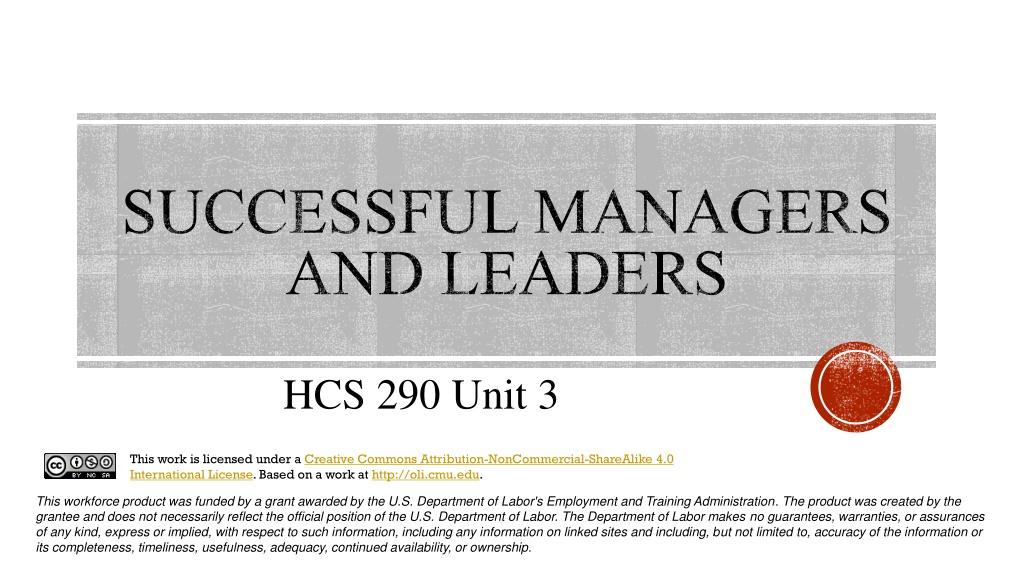
 undefined
undefined





 undefined
undefined






